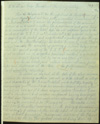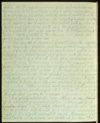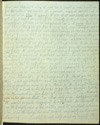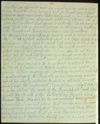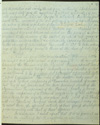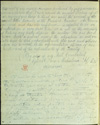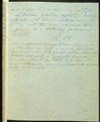Mahatma Letter No. 122
| Quick Facts | |
|---|---|
| People involved | |
| Written by: | Koot Hoomi |
| Received by: | A. P. Sinnett |
| Sent via: | possibly Bhola Deva Sarma, a chela |
| Dates | |
| Written on: | January 16, 1884 |
| Received on: | February 7, 1884 |
| Other dates: | unknown |
| Places | |
| Sent from: | Adyar, Chennai, India |
| Received at: | London |
| Via: | postal mail |
This is Letter No. 122 in The Mahatma Letters to A. P. Sinnett, 4th chronological edition. It corresponds to Letter No. 87 in Barker numbering. See below for Context and background.
< Prev letter chrono
Next letter chrono >
< Prev letter Barker
Next letter Barker >
Envelope
|
The words "From Bhola Deva Sarma" are written on the envelope of this letter which was posted at Adyar, 16th January, 1884, and received in London, February 7th, 1884. The postscript only is in K.H.'s writing. — ED. |
NOTES: |
Envelope
|
NOTES: |
Page 1 transcription, image, and notes
|
To, the London Lodge, Theosophical Society — Greeting. Since the telegrams to Mrs. Kingsford and Mr. Sinnett and my letter from Mysore have not been fully understood, I was ordered by the Maha-Chohan to advise the postponement of the annual election, so as to avoid anything like precipitancy and gain time for the consideration of this letter. After the cold reception given by the members of the L.L.T.S. on December the 16th to the proposal contained on page 29 of the printed and confidential circular of Mrs. Kingsford and Mr. Maitland (in the latter's Remarks and Propositions), namely the necessity of forming a distinct body or group within the general group of the L.L.T.S. — which proposition, if not identical in its suggested practical method, is so in substance with that thrown out by me in my letter of December 7th — on the one hand, and certain misconceptions, false hopes and displeasure on the other — the postponement was found absolutely necessary. As implied in my last, at the date of the above communication the burning question was not as to the literal or allegorical character of Mr. Sinnett's latest work but the loyalty or disloyalty of your President and her co-worker towards ourselves, whom many of you have seen fit to choose as your esoteric Teachers. From such a standpoint, and no other complaint having been lodged at that time (October 21st), an imperative necessity arose to maintain, in the wise words of Mrs. Kingsford — themselves but the echo of the Tathagatha's own voice — the policy of dissociating "the authority of names, whether in the past or in the present, from abstract principles." (Inaugural Address of the President, October 21st, 1883). The question involved being that of |
NOTES:
|
Page 2
|
justice, Mrs. Kingsford's ignorance of our real character, our doctrines and status (underlying as they do all her uncomplimentary remarks in connection with the present writer and his colleagues) made them of not even the weight of a flake of cotton in the matter of her re-election. This, coupled with her own intrinsic and individual worth and her charity to the poor brutes as also the fact of her asking Madam H. P. Blavatsky to "submit my (her) letter to Koothoomi" — made the former course the proper one. And now, the development of events since the despatch of the telegrams in question, will have perhaps suggested to some of you the true reasons for so unusual, not to say arbitrary, an action as an interference with the reserved elective rights of a Branch. Time often neutralizes the gravest evils by hastening a crisis. Moreover, and once more in the language of her address,-- (your President referring to a private letter of mine to Mr. Ward, which she had read, wherein I wrote, as she thinks) "in evident ignorance of the facts, and this is not wonderful" — we may be supposed to have been likewise ignorant of the forthcoming printed "Letter, private and confidential" circulated among the members of the L.L.T.S. on December the 16th. Thus she need hardly be surprised to find that this "Letter" has greatly altered the case. Always on the strength of the principle of impartial justice involved, we find ourselves obliged not to ratify literally our decision as to her re-election but to add to it certain clauses and make it henceforth impossible for the President and members to misconceive our mutual position. Far |
NOTES: |
Page 3
|
from our thoughts may it ever be to erect a new hierarchy for the future oppression of a priest-ridden world. As it was our wish then to signify to you that one could be both an active and useful member of the Society without inscribing himself our follower or co-religionist, so is it now. But it is just because the principle has to work both ways, that (our personal desire for her re-election notwithstanding) we feel and would have it known that we have no right to influence the free will of the members in this or any other matter. Such interference would be in flagrant contradiction to the basic law of esotericism that personal psychic growth accompanies pari passu the development of individual effort, and is the evidence of acquired personal merit. Moreover, a great discrepancy is observable in the reports to us of the effects produced by the "Kingsford — Sinnett incident" upon the members. In the face of this I find it impossible to accede to Mrs. Kingsford's several desires as expressed in her letters to Madam Blavatsky. If Mr. Massey and Mr. Ward give the lady their "entire approbation and sympathy" a very large majority of members seem to give theirs to Mr. Sinnett. Therefore, were I to act up to Mr. Massey's suggestion as reported by Mrs. Kingsford in her letter of December 20th in which she gives as his opinion that "a word only from Mahatma K.H. would be quite sufficient to reconcile Mr. Sinnett to my (the lady's) view of the matter and to establish between him and the Lodge the most perfect cordiality and understanding" — I would be actually making myself the |
|
NOTES: |
Page 4
|
quasi Pope she deprecates and an unjust and an arbitrary one besides. I would then truly lay myself and Mr. Sinnett open to just criticism, even more severe than that found in her inaugural address, in the several remarkable utterances wherein she affirms her "mistrust of all appeals to authority." One who has just said: "I look with sorrow and concern on the growing tendency of the Theosophical Society to introduce into its methods . . . the exaggerated veneration for persons and personal authority . . . the veritable outcome of which is a mere servile hero-worship . . . . . There is far too much talk among us about the Adepts our 'Masters' and the like. . . . Too much capital is made of their sayings and doings, etc. . . ." — should not have asked me for such interference even though sure that my faithful friend, Mr. Sinnett, would not have resented it. Were I to have acceded to the lady's desire to appoint her as the "Apostle of Eastern and Western Esotericism" and try to force her election on even one unwilling member, and taking advantage of Mr. Sinnett's never wavering warm regard for myself, influence his future attitude toward herself and the movement, I would then indeed deserve to be taunted as "the oracle of the Theosophists" and classed with "Jo Smith of the Latter-Day-Saints, and Thomas Lake Harris," the transcendental miscegenist of two worlds. I cannot believe that one who maintained only a few days previously that "our wise and truly theosophical course is not to set up new Popes and proclaim new Lords and Masters" — should now in her own case |
NOTES:
|
Page 5
|
seek the protection and evoke the aid of an "authority," which could only assert itself upon the hypothesis of a blind surrender of private judgment. And, as I prefer to attribute Mrs. Kingsford's desire to her ignorance of the real feeling of some of her colleagues, the nature of which is perhaps disguised now under the polished insincerities of civilized Western life, — I would recommend her and others interested in the present dispute to appeal to the decision of the ballot, by which all may express their wishes without invidiously exposing themselves to the charge of discourtesy. This would be but to take advantage of the privilege given to them at the close of Art. 3 of their Rules. And now for another consideration. However little we might care for personal subserviency to us, the accepted leaders of the Founders of the Parent Theosophical Society, we can never approve or tolerate disloyalty in any member of whatsoever Branch to the fundamental principles represented by the Parent Organization. The rules of the mother-body must be lived up to by those composing its Branches; provided of course, that they do not transcend the three declared objects of the organization. The experience of the Parent Society proves that the usefulness of a Branch very largely, if not entirely, depends upon the loyalty, discretion and zeal of its President and Secretary; however much their colleagues may do to assist them, the efficient activity of their group develops proportionately with that of those officers. In conclusion I must repeat that it is to prevent action in the matter of Mrs. Kingsford's re-election until the |
NOTES: |
Page 6
|
effacement of any misapprehension produced by my previous communications, that I have advised the annual election of office-bearers of your Lodge to stand over until the arrival of the present letter. Moreover, as the President-Founder — who knows our mind and has our confidence — is expected to be in England in a very short time, we do not see the necessity of taking any hasty steps in the matter. He has been given such a general view of the situation as will enable him to deal impartially with this case and others upon his arrival, as the representative at once of his Master and of the best interests of the Society. (By order of my Most Venerated Guru Deva Mahatma K भोलदेव शर्मा It would be wise to read this letter to the members — including Mrs. Kingsford — before the new day of election. I would have you prevent, if possible, another "coup de theatre." However natural such sensational surprises may be in politics when parties are composed of devotees whose souls rejoice in party intrigues, they are very painful to witness in an association of persons |
NOTES:
|
Page 7
|
who profess to give themselves up to the most solemn questions affecting human interest. Let meaner natures wrangle if they will; the wise compound their differences in a mutually forbearing spirit. Mr. Maitland's "Remarks and Observations on Esoteric Buddhism" are fully answered by Subba Row and another still greater scholar. They will be sent next week in pamphlet form, and Mr. Sinnett asked to distribute them among those members especially who may have been affected by the criticism. |
NOTES:
|
Context and background
This is the letter enclosed in Letter No. 121. It is signed, in Devanagari script, by Bhola Deva Sarma, for the Mahatma K.H., whose chela he was. It was written under the Mahatma’s direction.
The original telegram from the Mahatma saying that Mrs. Kingsford must remain President seemed to have complicated things. So, on January 16 (at the time of the writing of this letter) the Mahatma sent a second telegram to London, the text of which was "Postpone election. letter follows." It too was sent at the direction of the Mahachohan.
In compliance with the Mahatma’s suggestion, the London Lodge waited for Col. Olcott’s arrival and the election took place on April 7, 1884 with Olcott presiding. A compromise candidate, G. B. Finch, was elected President; A. P. Sinnett, Vice-President and Secretary; and Miss Francesca Arundale, Treasurer. Only five Councillors were elected, one of them being the scientist, Sir William Crookes, discoverer of Radiant Matter, whom the Mahatma had praised in one of his previous letters.
Col. Olcott describes the whole situation and the events in Old Diary Leaves, vol. 3, pp. 90-98. Before leaving Nice for London, he had issued a circular letter to all members of the London Lodge, asking them to send him separately, to Paris, and in confidence, their respective views about the situation. He brought these letters along with him to read on the train into London. He had just come to a passage in the letter from Bertram Keightley (one of the very loyal members of the Lodge and one who helped H. P. Blavatsky immeasurably later on when she was writing The Secret Doctrine, in which he affirmed his entire confidence that the Masters would order all things well, when, from the roof of the railway carriage, above Mohini’s head, a letter came fluttering down. It proved to be addressed to Olcott and gave him the necessary advice for the treatment of the difficulty.
The Colonel commented: "It was as if intended as a marked response to the loyal thought of the writer of the letter I was reading at the moment. I wish that everybody in the Society could realize how certain it is that those Great Brothers who are behind our work keep a vigilant eye upon all of us who with a pure heart and unselfish mind throw our energies into it. What more comforting than to know that our labors are not in vain nor our aspirations unheeded?"
The Colonel had earlier received a letter from the Mahatma phenomenally while still on shipboard on the way from India to England. He says, "If I had had the least doubt of it before, it would have been dispelled (by this letter)," which told him:
- Put all needed restraint upon your feelings, so that you may do the right thing in this Western imbroglio. Watch your first impressions. The mistakes you make are from failure to do this. Let neither your personal predilections, affections, suspicions, nor antipathies affect your action. Misunderstandings have grown up between the Fellows, both in London and Paris, which imperil the interests of the movement... try to remove such misconceptions as you will find, by kind persuasion and an appeal to the feeling of loyalty to the cause of truth, if not to us. Make all these men feel that we have no favorites, nor affections for persons but only for their good acts and for humanity as a whole.
This letter also carried the statement that "one of the most valuable effects of Upasika's [Blavatsky mission is that it drives men to self-study and destroys in them blind servility to persons." Josephine Ransom comments that "The Kingsford-Maitland group were vexed at the course of the election, as Dr. Kingsford — a woman of great force of character — had wished to be President, but they remained silent. Mr. Sinnett was speaking when, suddenly into the midst of this somewhat tense meeting came, astonishingly, H. P. Blavatsky, whom everyone thought to be in Paris. There was much excitement. She was conducted to the platform and introduced to those present."
The Kingsford group applied for a charter to form a separate branch. The President agreed, and the Hermetic Theosophical Society was formed. But the problem was not settled, as the members of the Hermetic Branch wished to belong also to the London Lodge so as to benefit by the course of instruction being given there. This Col. Olcott disallowed and made a provisional rule prohibiting multiple membership — that is, membership in more than one branch at a time. This decision upset the plans for the Hermetic Lodge. The Colonel suggested that Mrs. Kingsford return the charter and form her friends into an independent Society and thus make it feasible for them to belong to both. This was done.
Physical description of letter
The original is in the British Library, Folio 3. George Linton and Virginia Hanson described the letter this way:
In green ink on both sides of four sheets of full-sized white paper. The script is large, even, copy-book type. The postscript is in green ink. The letter is signed by Bhola Deva Sarma in Devanagari script. The P.Ps. (unsigned) is in KH script, and this is in green, and green and black intermingled. The envelope is in the B.M. Folio. On the back of it is written, "From Bhola Deva Sarma." He was one of the India Chelas. It seems likely that the letter was written by him under KH's direction. Sent with ML-84.[1]
Publication history
Commentary about this letter
Notes
- ↑ George E. Linton and Virginia Hanson, eds., Readers Guide to The Mahatma Letters to A. P. Sinnett (Adyar, Chennai, India: Theosophical Publishing House, 1972), 191-192.


